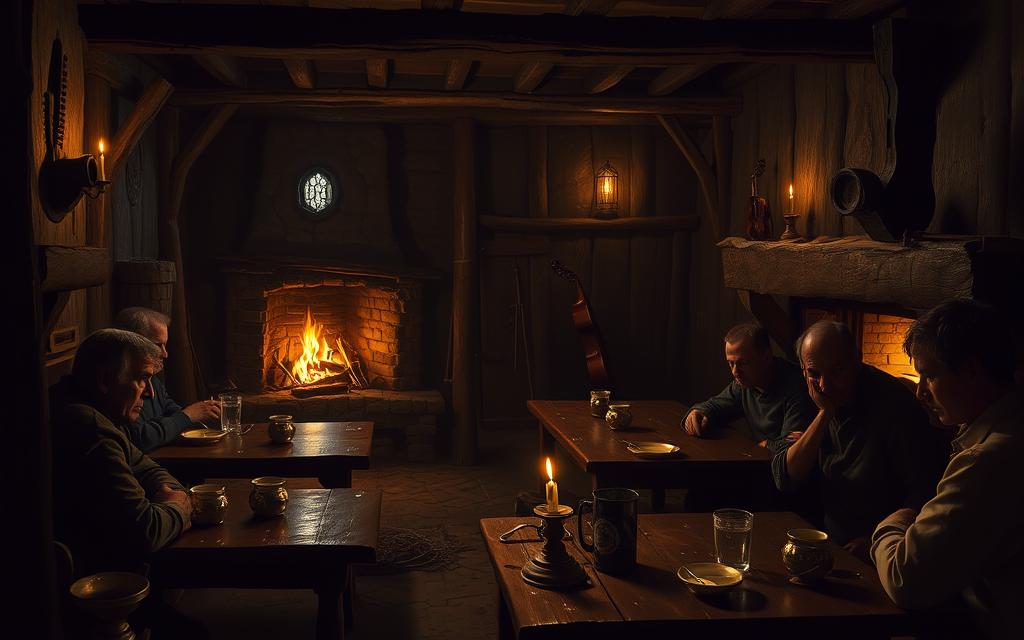Discover how Manor Lords Lack of Entertainment impacts your gameplay experience. Explore 5 key ways this scarcity affects player engagement and satisfaction.
Have you ever thought about how lords of the manor felt without entertainment? Their grand castles and power couldn’t fill the void of boredom. This lack of fun could affect their health and how well their vassals stayed engaged.
What secrets were hidden in the manorial system’s lack of entertainment? Let’s explore how this shortage of leisure activities changed the game for manor lords.
The Monotonous Medieval Lifestyle
Life in medieval manors was strict and offered little fun. Most people, the peasants, worked hard all day. They had no time for games or fun because they had to farm the land.
This lack of amusement made everyone feel bored and stuck. Even the lords, who ruled the manor, felt the same dullness.
Peasant Amusement Scarcity

Peasants in medieval manors had almost no fun. They spent their days working in the fields, leaving no time for play. There were no manorial recreation or lordly pastimes for them.
This made their lives very boring. They felt trapped in a never-ending cycle of work.
| Aspect | Description |
|---|---|
| Feudal Social Classes | The Feudal System in medieval villages included distinctions between serfs, who were bound to the land, and freemen, who had more freedom and could own or rent land. |
| Gender Roles | Gender roles in medieval villages were clearly defined, with men primarily responsible for agricultural labor and women managing the household economy. |
| Daily Routines | Daily routines in medieval villages were centered around agricultural tasks, with villagers starting their day at sunrise and ending at dusk, aligned with daylight hours. |
The lack of recreational activities and entertainment options in the medieval manor contributed to a pervasive sense of boredom and monotony that permeated the lives of its inhabitants, from the lowliest peasant to the ruling lord.
Castle Entertainment Deficit
Grand castles of manor lords were impressive in architecture and defense. Yet, they often lacked entertainment for their people. These structures focused on defense, leaving little room for fun.
The lords and their families had few ways to have fun. They had to stick to old, boring games. This made life in the castle dull and uninteresting.
This castle entertainment deficit made life boring for the manor lords. The lack of fun activities inside and outside the castle was a big problem. It made life dull for everyone in the manor.

The castle was a symbol of power but lacked fun. Its grandness couldn’t make up for the lack of entertainment. The lords wanted more exciting ways to have fun in their lives.
Manor Lords Lack of Entertainment
Feudal Leisure Activities
Manor lords had a lot of power but little entertainment. They enjoyed hunting, falconry, and jousting. But these activities were only for the rich and got old fast.
They felt bored and disconnected. They wanted more ways to have fun but found none. The lack of entertainment and dearth of seigneurial diversions made life dull.

Despite their wealth, manor lords had few feudal leisure activities. This led to boredom and disengagement in their lives.
Manorial Recreation Void
Inside the manor system, lords faced a big problem – not enough fun activities. This made them feel bored and disconnected. They had few ways to enjoy themselves, unlike the lively festivals of the peasants.
Lordly Pastimes Shortage
The lords didn’t have many ways to have fun. Unlike the peasants, they missed out on the rich social and cultural life of their estates. This made them feel distant and unhappy.
Without fun activities, the lords felt trapped. Their lives were dull and isolated. This made them question their place in the feudal world.
The manor lords were trapped in a gilded cage, their days devoid of the vibrant diversions that invigorated the lives of their subjects. This manorial recreation void was a heavy burden, one that threatened to erode their sense of purpose and connection to the lands they ruled.
Seigneurial Diversions Dearth
The medieval manor lords had a big problem. They lacked seigneurial diversions, which were fun activities fitting their high status. The strict feudal system and limited manor resources made it hard for them to find entertainment.
This dearth of seigneurial diversions made the manor lords feel bored and disconnected. It could harm the stability and work of their lands. They longed for exciting diversions to make their days more interesting.
The manor lords couldn’t enjoy the lively cultural and social events of royal courts. They had to find new ways to pass time and break the daily routine. This lack of entertainment made them feel isolated and unhappy. It might also have made it hard for them to manage their estates and lead their communities well.
“The estate of Bradfield Hall, manor, and lands were transferred to Arthur Young in 1672 through marriage to Elizabeth Canham. The estate was originally purchased in 1620 by Sir Thomas Jermyn of Rushbrooke.”
The seigneurial diversions dearth was a big problem for manor lords everywhere. It affected their leisure and fun. This lack of entertainment had big effects on the medieval manor system’s stability and work.
Conclusion
Manor lords in the medieval era faced big challenges due to a lack of entertainment. This scarcity of fun activities affected their happiness and the engagement of their vassals. The lack of entertainment in castles and the shortage of pastimes for lords made life dull and unhappy.
The monotonous medieval lifestyle was a big problem for manor lords. Despite their power, they couldn’t find ways to relax. This lack of entertainment could harm the stability and productivity of their lands.
Looking into the manor system’s history shows us how important leisure and recreation are. Understanding the impact of this lack helps us see the full picture of medieval life. It shows us how experiences were shaped within the manor system.



